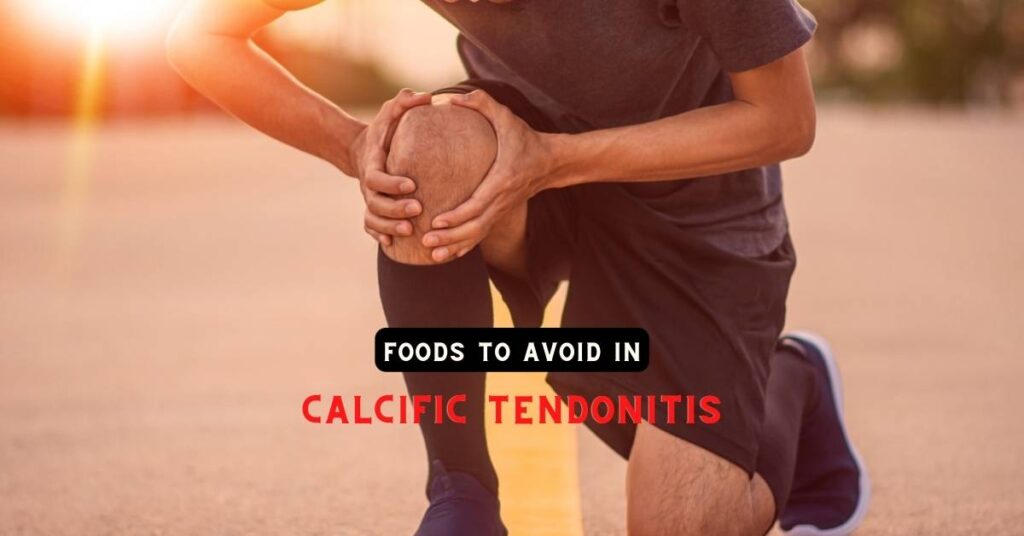Calcific tendonitis is a painful condition characterized by the formation of calcium deposits in tendons, most commonly affecting the shoulder. This condition can cause significant discomfort and limit mobility. While treatment often involves rest, medication, and physical therapy, diet plays a crucial role in managing symptoms and promoting healing.
What is Tendonitis?
Before delving into calcific tendonitis specifically, it’s essential to understand tendonitis in general. Tendonitis is inflammation in the tendons, which are fibrous connective tissues that connect muscles to bones. This condition is usually caused by:
- Repetitive movements
- Injuries
- Inflammation built up over time
Various forms of tendonitis are named based on the location of the pain or its cause, such as:
- Tennis elbow
- Golfer’s elbow
- Pitcher’s shoulder
- Swimmer’s shoulder
- Jumper’s knee
Symptoms of Calcific Tendonitis
Calcific tendonitis can cause several uncomfortable symptoms, including:
- Extreme pain
- Discomfort
- Swelling
- Tenderness
- Stiffness
These symptoms can significantly impact daily activities and quality of life.
The Role of Nutrition in Calcific Tendonitis
Proper nutrition is crucial in managing calcific tendonitis. A well-balanced diet can help:
- Reduce inflammation
- Improve blood circulation
- Enhance nutrient delivery to tendons
- Prevent further tissue damage
By focusing on the right foods and avoiding those that exacerbate inflammation, you can support your body’s healing process and potentially alleviate symptoms.
Foods To Avoid With Calcific Tendonitis

To effectively manage calcific tendonitis, it’s crucial to identify and eliminate foods that can worsen inflammation and pain. Here’s a comprehensive list of foods to avoid with calcific tendonitis:
1. Fatty Foods
There’s a clear link between fatty foods and tendonitis. A diet high in unhealthy fats can exacerbate calcific tendonitis by:
- Adversely affecting calcium uptake
- Hindering bone repair
- Increasing overall inflammation in the body
Obese individuals are almost twice as likely to suffer from tendonitis compared to those at a healthy weight. If you’re overweight or obese, consider making lifestyle changes to support your tendon health.
Foods to avoid:
- Deep-fried foods
- Fast food
- Processed snacks high in trans fats
- Fatty cuts of meat
2. Foods Rich in Sugar
Sugary foods have been shown to deteriorate calcific tendonitis. Excessive sugar consumption may:
- Hinder bone growth by raising blood glucose levels
- Adversely affect shoulders, hips, and knees
- Cause pain, stiffness, and difficulty moving affected joints
- Lead to signs of degeneration such as bone spurs and tears
Foods to avoid:
- Candy
- Soft drinks
- Pastries
- Sweetened cereals
- Flavored yogurts with added sugars
3. Processed Meats
Recent research suggests that processed meats may increase the risk of calcific tendonitis and other health problems. These foods can:
- Deplete calcium from bones
- Promote calcium expulsion through urine
- Increase overall inflammation in the body
Foods to avoid:
- Sausages
- Hot dogs
- Bacon
- Deli meats
- Canned meats
4. Dairy Products
While dairy products are often touted for their calcium content, they can be problematic for individuals with calcific tendonitis. Calcium-rich dairy foods can:
- Lead to an increase in blood levels of phosphorus
- Cause calcification of soft tissues like muscles and ligaments
- Drain calcium from bones, making them weak
- Promote calcium deposits in bones, resulting in inflammation and tenderness
Foods to avoid:
- Whole milk
- Cheese
- Ice cream
- Yogurt (especially those with added sugars)
5. Caffeinated Beverages
Caffeinated beverages have been linked to various health problems, including an increased risk of calcific tendonitis. Caffeine can:
- Deplete bone calcium, weakening bones
- Aid in the development of calcific tendonitis
- Increase stress levels
- Potentially lead to depression
Beverages to avoid:
- Coffee
- Energy drinks
- Caffeinated sodas
- Black tea
6. Excess Alcohol
Alcohol consumption can lead to many health problems, including exacerbating calcific tendonitis. Excessive alcohol intake can:
- Affect the body’s absorption of calcium and vitamin D
- Interfere with proper bone formation and maintenance
- Increase accumulation of calcium deposits in tendons
- Lead to further pain and inflammation
While moderate consumption may be acceptable for some, it’s best to consult with your healthcare provider about alcohol consumption if you have calcific tendonitis.
7. Foods High in Sodium
While sodium is an essential mineral, excess salt can be harmful as it interferes with the body’s calcium balance, affecting calcific tendonitis. High sodium intake can:
- Cause the body to excrete calcium through urine
- Deplete calcium reserves
- Lead to weak bones and potentially osteoporosis
Foods to avoid:
- Processed foods
- Canned soups
- Salty snacks
- Fast food
- Condiments high in sodium
8. Foods Rich in Omega-6 Fatty Acids
While omega-6 fatty acids are essential in small amounts, excessive consumption can aggravate calcific tendonitis. These foods tend to promote inflammation by releasing harmful chemicals.
Foods to limit:
- Vegetable oils (corn, safflower, soybean, cottonseed)
- Processed snack foods
- Some nuts and seeds high in omega-6
9. Nightshade Vegetables
Although generally healthy, nightshade vegetables can potentially increase inflammation in some individuals, especially those with autoimmune conditions or sensitivities.
Foods to consider limiting:
- Tomatoes
- Eggplant
- Bell peppers
- Potatoes
10. Refined Grains
Refined grains have a high glycemic index, which can impact blood sugar levels and potentially increase inflammation.
Foods to avoid:
- White bread
- White pasta
- White rice
- Refined cereals
What to Eat: Foods That Support Tendon Health
While avoiding certain foods is crucial, it’s equally important to incorporate foods that can help reduce inflammation and support tendon health. Here’s a list of foods to include in your diet:
1. Dark Leafy Greens
Rich in antioxidants, dark leafy greens fight oxidative stress – one of the main causes of inflammation. These nutrient-dense vegetables are packed with:
- Vitamin A
- Vitamin C
- Vitamin D+K
- Folate
- Magnesium
Foods to include:
- Broccoli
- Spinach
- Bok choy
- Brussels sprouts
- Kale
- Cabbage
- Cauliflower
- Rocket (arugula)
Aim to have at least half of your plate filled with either raw or cooked vegetables.
2. Lean Proteins
Protein is essential for repairing broken tissue. A lack of dietary protein can cause weakness, delayed recovery, pain, and fatigue.
Foods to include:
- Organic chicken
- Turkey
- Grass-fed beef
- Wild-caught fish
- Eggs
- Bone broth (naturally contains collagen, excellent for healing tendons)
3. Vitamin C-Rich Foods
Vitamin C is essential for rebuilding collagen, which is crucial for tendon health.
Foods to include:
- Berries
- Pineapples
- Citrus fruits
- Peppers
- Broccoli
- Squash
- Sweet potatoes
4. Zinc-Rich Foods
Zinc aids in tissue development and repair.
Foods to include:
- Beef
- Pumpkin seeds
- Spinach
- Beans
- Whole grains
5. Potassium and Magnesium-Containing Foods
These minerals can speed healing, help with muscle recovery, improve circulation, and promote relaxation in the body.
Foods to include:
- Avocado
- Coconut/coconut water
- Bananas
- Mushrooms
- Sweet potatoes
6. Anti-Inflammatory Spices
Certain spices have potent anti-inflammatory properties that can help manage calcific tendonitis symptoms.
Spices to include:
- Turmeric (contains curcumin, a powerful anti-inflammatory compound)
- Ginger
- Cinnamon
- Garlic
7. Omega-3 Fatty Acids
Unlike omega-6 fatty acids, omega-3s have anti-inflammatory properties.
Foods to include:
- Fatty fish (salmon, mackerel, sardines)
- Flaxseeds
- Chia seeds
- Walnuts
8. Green Tea
Rich in antioxidants, green tea can help reduce inflammation and provide numerous other health benefits.
The Mediterranean Diet: A Model for Anti-Inflammatory Eating
The Mediterranean diet has been proven effective against inflammatory conditions. This eating pattern emphasizes:
- Fresh fruits and vegetables
- Whole grains
- Lean proteins (especially fish)
- Healthy fats (olive oil, nuts, seeds)
- Limited red meat consumption
- Moderate wine consumption (if appropriate)
By following a Mediterranean-style diet, you may be able to reduce inflammation and improve your overall health, potentially alleviating symptoms of calcific tendonitis.
Supplements That May Help
In addition to a healthy diet, certain supplements may help manage calcific tendonitis symptoms. However, it’s crucial to consult with a healthcare professional before starting any supplement regimen.
Potential helpful supplements include:
- Omega-3 fatty acids
- Collagen
- Vitamin D
- Bromelain
- Zinc
Note: Speak to an expert nutritionist about proper dosage, as improper supplementation can impact your health long-term.
Lifestyle Factors to Consider
While diet plays a significant role in managing calcific tendonitis, other lifestyle factors are equally important:
1. Regular Exercise
Engaging in regular, moderate exercise can help:
- Improve blood circulation
- Strengthen muscles and tendons
- Maintain a healthy weight
However, avoid overexertion and “weekend warrior” practices, which can lead to injury.
2. Proper Posture
Maintaining good posture can reduce strain on tendons. Consider:
- Using an ergonomic workstation
- Taking regular breaks to move and stretch
- Practicing proper body mechanics when lifting or performing repetitive tasks
3. Stress Management
Chronic stress can contribute to inflammation in the body. Incorporate stress-reduction techniques such as:
- Meditation
- Deep breathing exercises
- Yoga
- Regular relaxation time
4. Adequate Sleep
Proper sleep is crucial for healing and reducing inflammation. Aim for 7-9 hours of quality sleep each night.
5. Hydration
Staying well-hydrated is essential for overall health and can help reduce inflammation. Aim to drink plenty of water throughout the day.
When to Seek Professional Help
While dietary changes can significantly impact calcific tendonitis symptoms, it’s essential to work with healthcare professionals for comprehensive treatment. Seek medical attention if you experience:
- Severe pain
- Inability to move the affected joint
- Signs of infection (redness, warmth, fever)
- Symptoms that don’t improve with self-care measures
Your healthcare provider may recommend additional treatments such as:
- Physical therapy
- Medications (anti-inflammatories, pain relievers)
- Corticosteroid injections
- Ultrasound-guided needling
- Surgery (in severe cases)
Conclusion
Managing calcific tendonitis requires a multifaceted approach, with diet playing a crucial role. By avoiding foods that exacerbate calcific tendonitis and incorporating anti-inflammatory foods into your diet, you can potentially reduce symptoms and support your body’s healing process.
Remember, the key foods to avoid include:
- Fatty foods
- Sugar-rich foods
- Processed meats
- Excessive dairy
- Caffeinated beverages
- Alcohol
- High-sodium foods
- Foods rich in omega-6 fatty acids
Instead, focus on a diet rich in:
- Dark leafy greens
- Lean proteins
- Vitamin C-rich foods
- Zinc-rich foods
- Potassium and magnesium-containing foods
- Anti-inflammatory spices
- Omega-3 fatty acids
Combine these dietary changes with regular exercise, proper posture, stress management, adequate sleep, and hydration for the best results. Always consult with healthcare professionals for personalized advice and treatment plans.
By making these lifestyle and dietary changes, you can take significant steps towards managing your calcific tendonitis and improving your overall quality of life.

Sandra Hernandez, a resident of New York, is an active contributor on lifebing.com. Her passion for knowledge fuels her writing journey as she delves into fascinating topics that capture her curiosity.
